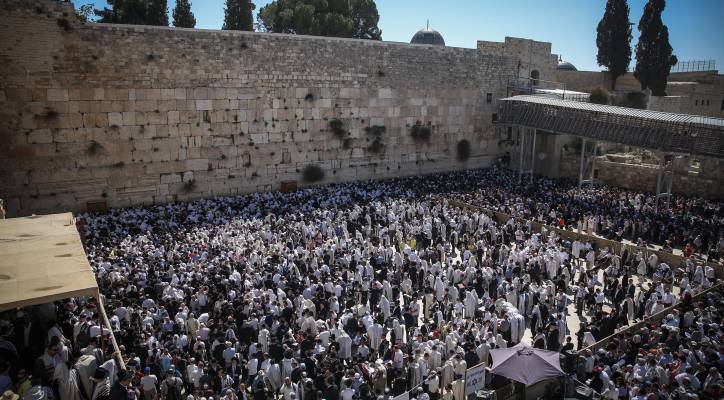
By Rabbi Ari Enkin, Rabbinic Director, United with Israel
Leaving our homes while ascending to Jerusalem for the holidays demonstrates faith that God is indeed the Master of our land, our possessions and, by extension, our lives.
This week’s Torah portion is Ki Tisa (Exodus 30:11-34:35). There certainly is a lot to talk about in this week’s Torah portion, as one of the highlights of Ki Tisa is the terrible sin (the national disaster, actually) of the Golden Calf.
However, I am going to “pass-over” the episode of the Golden Calf and bring your attention to a verse towards the very end of the Torah portion. The Torah tells us: “Three times a year all males must appear before the Master, God of Israel” (Exodus 34:23) referring to the ancient obligation for all male Jews to make the pilgrimage to Jerusalem on the holidays of Passover (now even less than 30 days away!), Shavuot, and Sukkot. This mitzvah (commandment) is known as Aliya L’regel.
Now here’s what’s really unique about the mitzvah of Aliya L’regel (appearing before God in Jerusalem on the holidays): The Torah promises that God will protect the property and possessions of those who perform this mitzvah! That’s right – if you pack up and travel to Jerusalem for the holidays as the Torah instructs us to, God Himself will guard your house: 24 hour patrols. Video cameras. Booby traps. The works. Your possessions will be safe. As the Torah says: “No man will covet your land when you go up to appear before God three times a year. (Exodus 34:34).
Seems pretty simple and enticing: Vacation in Jerusalem on the holidays and God will take care of your belongings back home. However, there may very well be a deeper message here. Not every male was required to appear in Jerusalem on holidays. Only those who owned land. One who owned no land in the Land of Israel was exempt from having to make the pilgrimage.
The commentators ask: Why should someone be exempt from the mitzvah of Aliya L’regel just because he doesn’t own land? Why should he be deprived of the opportunity, the excitement, and the spiritual inspiration that the pilgrims would enjoy when visiting Jerusalem on the holidays? Are the poor second-class citizens? Another question is with the use of the word “Master” when describing God in relation to this mitzvah. The word “Master” is only found in one other place in the Torah, and there too, it is in reference to going up to Jerusalem on the festivals.
The answer, we are taught, is that “Master,” in this context, refers to God as being the Master of the Land. Indeed, the entire world belongs to God, with the Land of Israel being his most beloved piece of land. Leaving our homes and our possessions while ascending to Jerusalem for the holidays demonstrates faith that God is indeed the Master of our land, our possessions and, by extension, our lives. We have nothing to worry about – it’s all in His hands.
Aliyah L’regel – visiting the Temple Mount during the Festivals – is to remind us that the Lord is the only landlord we really have!
Shabbat Shalom from Israel!
